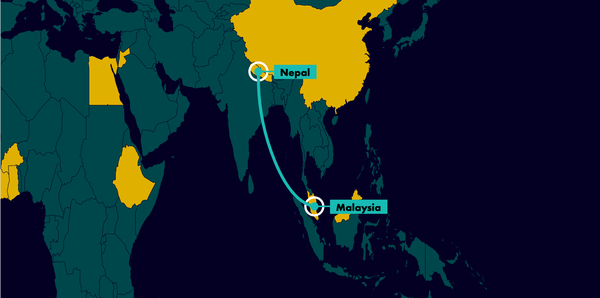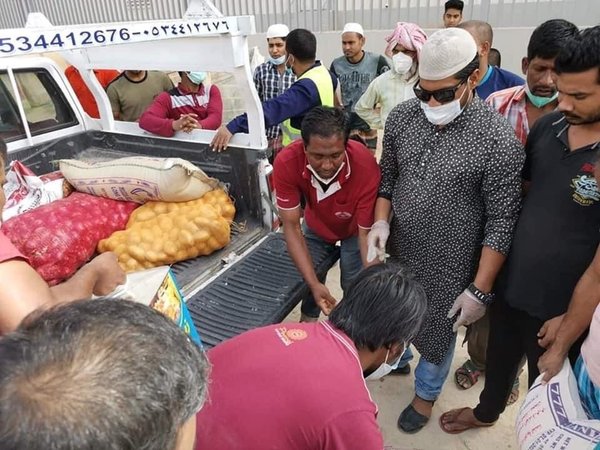
Construction worker in Nepal. Photo by Robic Upadhaya. Used with permission.
The current pandemic has negatively affected the global economy. The world will reportedly lose $8.5 trillion in output over the next two years. If economic downturn is inevitable in all countries, Nepal will surely be impacted.
Nepal's economy relies on the export of its human resources, tying it to the health of the global economy. An estimated 2 million Nepalis work overseas. And every year around 500,000 youth tries to go abroad to work. The future of Nepali migrant workers abroad, and aspiring migrants, therefore depends on global economy as well as global health. Recruitment agencies, which typically support Nepali workers going abroad, are increasingly playing a role in supporting migrants returning home during the pandemic.
Not all bad news: Nepalis are coming home
Around 250,000 Nepalis working abroad lost their jobs within the first two months of lockdowns being implemented around the world. The loss of jobs and complete halt of youth joining the global workforce market seriously jeopardize remittance earnings sent to the Nepalese economy.
However, as saying goes, “every cloud has a silver lining”. The increase in migrant returnees has been a positive development. Internal migrants who left urban areas such as Kathmandu are returning home to actively help in agricultural activity. The introduction of amnesty in the Gulf and Malaysia has paved a way for the safe and legal return of labour migrants who were dispossessed of their documents, and were thus staying illegally.
A larger majority of Nepali migrants work in low-skilled jobs such as construction, and many of these projects have been halted due to COVID-19. For example, 33.5% of migrants working as physical laborers have lost jobs. A large share of migrant returnees will therefore have experience in the construction sector.
Workers who have lost their jobs, along with those whose contracts have expired and who remain undocumented, expect the government to take action to bring them back home. The government has given COVID-19 Crisis Management Centre (CCMC) the responsibility to manage people seeking to return to Nepal and those who have started the return process. To accommodate them in the labour market once they return, the government is planning to generate an additional 2.5 million jobs within Nepal in various sectors.
The recruitment industry at a standstill
The pandemic has also affected the various intermediaries that play multitude roles in connecting aspiring migrants to their jobs in destination. The industry of foreign employment in Nepal has come to a complete stop. “Recruitment agencies”, which are part of larger intermediaries, have been directly affected by the pandemic.
There are 854 agencies (known as recruitment agencies or locally as “manpower”) and an additional 50,000 brokers operating in Nepal’s recruitment industry. Recruitment agencies are globally recognised as “merchants”, “predatory princes”, “princely peddlers” and a “necessary evil”, and they are part of a much broader, extensive labour migration system. The recruitment agencies in Nepal are also known for their, unethical behaviour, exploitation, and rights’ violation are norms.
However, we should recognise that recruitment agencies and brokers play an important part in creating employment prospects for Nepalis both in Nepal and abroad. Despite the pandemic, they will continue to be an important part of migration for the foreseeable future. Hence, we should be sensitive to the impact of the pandemic on the industry, and on the migrants who rely on them, as their operations stop completely. The recruitment agencies who are legally registered, compared to the almost non-existent legal brokers, have enough lobbying power to make the Nepali government respond to their loss. As a start, the government is preparing to remove “the provision that any agency should send at least 100 workers abroad in one year to renew its licence”. However, this has been criticised as a step backwards from the gains achieved in the fight against unethical practices of recruitment agencies.
Recruiters have a chance to help migrants returning home
There are alternative solutions. While they may not be able to find jobs for migrant workers in other countries may be in the current pandemic, recruitment agencies can play a role in “protecting migrant workers”. In fact, as IOM Deputy Director General Laura Thompson highlighted, recruiters are already helping migrant returnees:
Recruitment agencies are also on the frontlines of helping migrant workers get home and supporting those who have already returned to access social assistance, seek alternative livelihood opportunities and navigate the challenges related to reintegration in a time of mandatory quarantine and social distancing.
Recruitment agencies could therefore be of immense help in protecting migrant workers. The IOM Nepal has conducted a survey by working alongside recruitment agencies, “to better understand the Covid-19 impacts on migrant workers in Destination countries and PRAs in Nepal”. The report emphasises that recruitment agencies are important resources for ensuring migrants’ welfare during and after the pandemic
By virtue of connecting job seekers with employers, recruitment agencies have a greater knowledge of the skillset each migrant has and their employment history in destination countries. Hence, they have an efficient mechanism for targeting specific groups of job seekers and their level of expertise. As pointed out by the ILO, private employment agencies are hugely beneficial due to their “ability to intervene rapidly and efficiently in a designated sector of the labour market”. Likewise, they also have long experience in “finding, screening and preparing candidates” for labour markets.
With government agencies planning to generate an additional 2.5 million jobs within Nepal, and their niche in the labour market, recruitment agencies can play a catalytic role in matching the skillset with the job requirement. For instance, the orientation class given to migrants going abroad could be used to match return migrants with various government schemes. Recruiters can base this on migrants’ interests in entrepreneurship and give them information about how to access these schemes.
An opportunity for employment in Nepal
On the other hand, the government pride projects were in shambles due to various reasons well before the pandemic. One of the problems identified by the Federation of Contractors Association Nepal (FCAN) is brain drain in the sector. The government commitment to continue with big development projects during the pandemic has provided an opportunity to employ migrant returnees in the 21 national infrastructure pride projects. Finding, screening, and connecting the migrant labour force with experience in the construction sector, particularly those who worked in massive projects and have a knowledge of operating machinery as well as manage the projects to various government projects, could support the progress of national pride projects.
Besides the traditional role of Nepalese recruitment agencies sending workers abroad, now is an opportunity to diversify their roles and use them as a resource to connect government and private agencies with migrant workers. This collaboration has the potential to enable returnee migrants to seek an alternative livelihood in Nepal, as well as be economically viable for the recruitment agencies at a time when their entire operation is on standby. Therefore, there is an opportunity for recruitment agencies to provide an alternative means of job matching as their core service, not for labour markets abroad but within Nepal.



